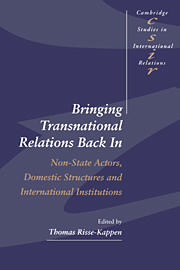 Bringing Transnational Relations Back In
Bringing Transnational Relations Back In Book contents
- Frontmatter
- Contents
- List of tables
- List of contributors
- Preface
- List of abbreviations
- Setting the agenda
- Case studies
- Conclusions: So what?
- 8 Power politics, institutions, and transnational relations
- 9 Structures of governance and transnational relations: what have we learned?
- Index
- CAMBRIDGE STUDIES IN INTERNATIONAL RELATIONS
8 - Power politics, institutions, and transnational relations
Published online by Cambridge University Press: 02 December 2009
- Frontmatter
- Contents
- List of tables
- List of contributors
- Preface
- List of abbreviations
- Setting the agenda
- Case studies
- Conclusions: So what?
- 8 Power politics, institutions, and transnational relations
- 9 Structures of governance and transnational relations: what have we learned?
- Index
- CAMBRIDGE STUDIES IN INTERNATIONAL RELATIONS
Summary
Introduction
Neorealism has the great analytic virtues of parsimony and heuristic power. But even its most forceful proponents do not claim that it provides a complete description and analysis of international politics or foreign policy. For neorealism, states, understood as unified rational actors that embody the capabilities within a given territory, are the ontological givens. Systemic outcomes are a function of the distribution of power among states. The only analysis that neorealism can offer for the foreign policy of a specific state is based on the power capabilities of that state and the overall distribution of power in the system. Neorealism has little to say about transnational relations. For that matter it has little to say about domestic politics either.
If, however, emphasis is given not to states as unified rational actors, but rather to another critical aspect of realism, the assumption of anarchy, then transnational actors must be a natural component of a sovereign state system. By definition, transnational relations could not occur in an empire; that is, a political system in which there is only one supreme political authority. All interactions in such a system must be domestic. Transnational actors can only exist in a system in which there are mutually exclusive multiple centers of political authority. If there is anarchy, if there is no supreme political authority, then transnational phenomena will almost certainly be present. Only if states were completely autarkic, or if all interactions across borders were conducted by official state functionaries, would there be no transnational actors.
- Type
- Chapter
- Information
- Bringing Transnational Relations Back InNon-State Actors, Domestic Structures and International Institutions, pp. 257 - 279Publisher: Cambridge University PressPrint publication year: 1995
- 41
- Cited by


